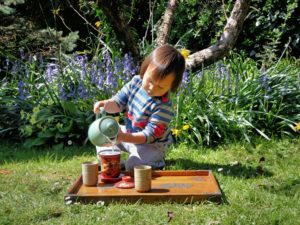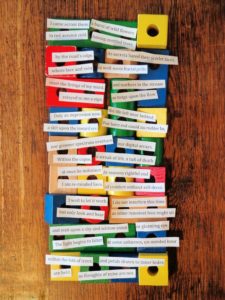In 2016, I was a Category Winner in the Images of Research competition with the photograph entitled “Tea Ceremony”, which came under the category heading, ‘Society and Culture’. My second entry, “A Life Left Near Behind”, was also featured in the public exhibitions, in the Sustainable Futures category.

“Tea Ceremony”, is an example of the ‘tangification’ of under-represented and often intangible heritages, such as the blended inheritances, experiences and identities of mixed race children. As a researcher (at the time in intellectual property law), writer and photographer, I combined these skills to create an image which would capture the power of visibility, dissemination and copyright when it comes to protecting cultures and peoples who are frequently under-represented or misrepresented in the mainstream media. I am pursuing an academic career in creative writing but my background is in history, and I remain deeply committed to rediscovering and promoting the understanding of lost and under-represented histories, through creative exhibitions and publications which can help to debunk myths, undermine stereotypes and open our minds.
I am therefore passionate about the imaginative creation and curation of digital cultural and heritage content for educational purposes. While editing my first novel, I am exploring in particular, how literary fiction may be engaged with in new ways, using the latest in digital technologies and design. I am also interested in how it can simultaneously entertain, enlighten and inspire us towards healthier and more sustainable cultures and environments. I am fascinated by the ways in which our received cultural heritage, including that which is conveyed in literary fiction, journalism and other forms of creative writing, gives us our sense of identity and purpose, resulting in our differing beliefs and visions of what constitutes ‘the good life’ or ‘the good society’.

Both images were originally taken for my research-inspired arts initiative, which aimed, through collaboration between researchers, independent artists and the creative industries, to communicate research data, discoveries, questions and insights in new and exciting ways that will have more impact on policy-makers and the wider public than traditional publications. “A Life Left Near Behind” is a photograph of an installation I created with a poem I originally wrote for my Poetry of Places project. The project explores the ways in which we interpret and are formed and transformed by the natural environments we experience. The project uses fusion art-forms to convey the value to be found in earth’s natural environments, particularly the value of these environments for our health and well-being, and frames this thinking from a human rights perspective.
During my three years at the University of Exeter, public engagement and impact were at the heart of my work. I was an Associate Research Fellow at the University of Exeter (2014 – 2017) in the School of Law, working on the Europeana Space Project. This was a high profile, international and multi-stakeholder project funded by the European Commission. I worked in close collaboration with 29+ partners in the creative industries, culture sector and across disciplines in higher education, as well as with independent artists and cultural entrepreneurs. We sought to facilitate the creative reuse of digital cultural content for educational and commercial purposes, job creation and economy boosting across Europe. I was also academic host to an artist in residence for the ACE funded Exeter Enquiries project, and I ran my own Culture-Makers Project in collaboration with the Royal Albert Memorial Museum and Art Gallery, which was funded by a Researcher-led Initiative Award and a School of Social Sciences and International Studies Strategic Discretionary Award.
I am now a researcher at the University of Plymouth, working on the AHRC funded project ‘Imagining Alternatives: Utopia, Community and the Novel 1880-2015’. Impact and public engagement are once again central to my role, as I am responsible for creating and editing content for the project’s webpages, and for organising the workshops, public lectures and initial ‘Feasts for the Future’, in collaboration with our partners at Regen SW, a not-for-profit social enterprise which helps local communities develop ambitious renewable energy and energy efficiency projects.
We tend to look at our communities in the light of the past and all the environmental challenges we face because of it. At the heart of the ‘Feasts for the Future’ project, is the idea that if we look at ourselves from the perspective of possible future communities instead, we will take more positive action in the present. By sharing a meal and telling stories about the ground-breaking renewable energy and energy efficiency projects taking place successfully in our region and around the world, we can develop a realistic and cooperative vision of what our communities could be like in the future. This vision may be more effective than the ever-present threat of destruction and disaster in motivating communities to take on ambitious projects that will transform the way we live. Our project web pages will be live soon, and links to these and further information about my research can be found on my blog at www.somervillewong.wordpress.com.
The Images of Research competition highlights the importance of using different forms of media to capture the interest of those outside your field; across disciplines, across borders, and across industries. Humans are creatures of five senses, and the reality is, no one will want to know about your research, let alone engage with the detail, if the exciting ideas and the potential of it are hidden behind a smokescreen of semantic quibbling and jargon. Academics are increasingly expected to enter into knowledge exchange with other professionals and to reach a wider audience with their research findings, in addition to fulfilling the requirements of traditional academic publications. I believe that if we maintain our accuracy and our integrity, this change can only be a good thing.
Written by: Anastasia Sommerville-Wong
If you are an ECR who wishes to submit an entry to this year’s Images of Research, the deadline is: Sunday 6 May- 23:59 (GMT). Full details about the competition can be found here: http://www.exeter.ac.uk/doctoralcollege/early-career-researchers/imagesofresearch/
